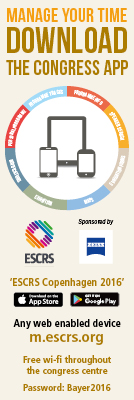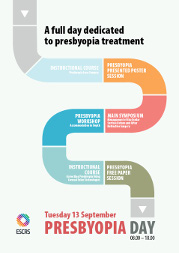Posters
Computer-based tutorial as a supportive means to enhance quality and efficiency of the informed consent process for cataract surgery
Poster Details
First Author: M. Ullrich AUSTRIA
Co Author(s): S. Schuschitz N. Hirnschall B. Doller K. Kefer R. Varsits O. Findl
Abstract Details
Purpose:
To assess whether informing patients with an interactive computer-based tool in addition to face-to-face discussion with their physician reduces face-to-face discussion time, increases the patient’s knowledge and influences the patient’s attitude towards surgery.
Setting:
Vienna Institute for Research in Ocular Surgery, A Karl-Landsteiner-Institute, Hanusch Hospital, Vienna, Austria.
Methods:
Patients with bilateral cataract scheduled for cataract surgery were randomly allocated to the study group or control group. Patients in the study group were given an interactive computer-based tool (CatInfo) containing a detailed audiovisual presentation about cataracts and its treatment. All patients had a face-to-face informed-consent discussion with a physician. Duration of the informed-consent discussion was measured. Afterwards, patients in both groups received the same validated questionnaire with cataract-related questions as well as questionnaires assessing the decisional conflict. Patients were interviewed via phone one month post-operatively to reflect on their decision (decision regret scale).
Results:
Preliminary results of 41 study group patients and 45 control group patients were analysed. The mean age was 69 years (51-91 years) and 71 years (52-93 years) respectively. The duration of the face-to-face informed consent interview was significantly shorter in the study group compared to the control group, 1 minute 58 seconds versus 2 minutes 23 seconds (IQR 63–177 versus 104–274 sec; p=0.014). Patients in the study group answered slightly more questions correctly than patients in the control group (16.3 versus 15.6 out of 19 points). This was not statistically significant (p=0.07). Detailed final results will be presented.
Conclusions:
Duration of the face-to-face consent process was significantly shorter in the study group, nonetheless the patient’s knowledge was only slightly improved. These findings show that the interactive computer-based tool is a useful approach to document the informed consent procedure and to reduce face-to-face informed-consent discussion time without decreasing the patient’s knowledge.
Financial Disclosure:
NONE





